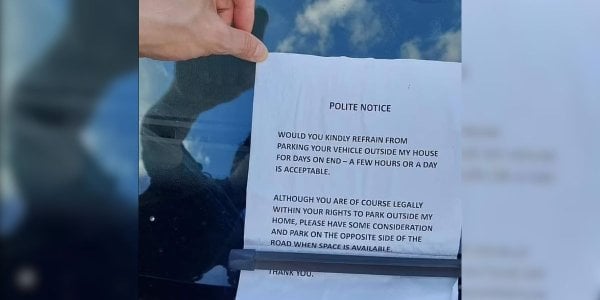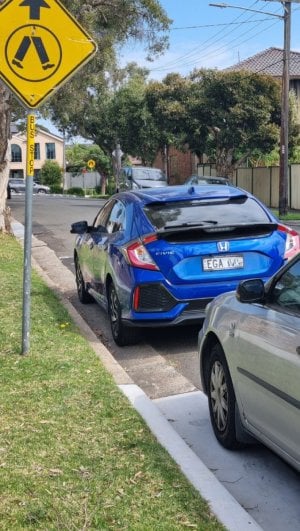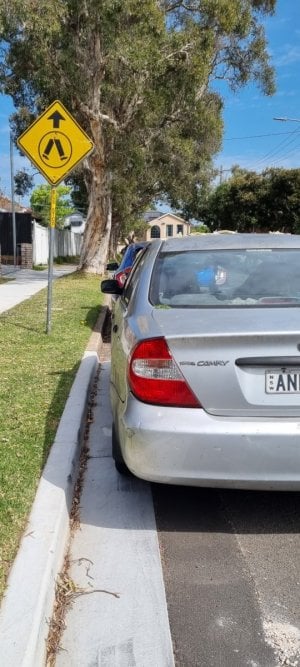The Note Left on This Driver's Windscreen Is Causing Outrage – Are You Guilty of This 'Common Courtesy' Mistake?
By
Seia Ibanez
- Replies 25
In the realm of suburban life, where the streets are lined with family homes and neatly trimmed hedges, a new battleground has emerged: the humble kerbside parking space. The latest skirmish in this ongoing war of wheels and wills has sparked a heated debate among Australians, after a driver found a note on his windscreen that has since gone viral.
The note, which the recipient described as 'polite', was left by a neighbour and read: 'Would you kindly refrain from parking your vehicle outside my house for days on end - a few hours or a day is acceptable. Although you are of course legally within your rights... please have some consideration and park on the opposite side of the road when space is available.'

This seemingly courteous request has divided opinions across the nation, with thousands weighing in on what constitutes 'common courtesy' in the context of public street parking. Some argue that it's simply good manners to avoid parking in front of a neighbour's house when other options are available. 'It's about being considerate of others,' one person commented, supporting the sentiment of the note.
On the flip side, others see the note as a veiled form of entitlement and passive aggression. 'It's not polite, it's passive aggressive and very much entitled,' one detractor argued, highlighting that public streets are just that – public. The right to park anywhere legally permissible is a privilege paid for through vehicle registration, they claim, and not one to be curtailed by the preferences of nearby residents.
The debate doesn't stop at mere opinions, though. Some have suggested that the use of the term 'polite notice' is a sneaky tactic to command attention, with the hope that at a glance, it might be mistaken for an official 'police notice'. Whether this is a strategic move or an innocent choice of words is up for debate, but it certainly has people talking.
Amidst the back-and-forth, there are those who advocate for a return to neighbourly values, suggesting that a little consideration goes a long way. 'There's nothing wrong with just being a good neighbour,' one comment read, reminding us that community spirit can sometimes be lost in the hustle and bustle of daily life.
This incident is not an isolated one. In a similar vein, a Queensland mother was left stunned after receiving a 'vile' note on her car, berating her for quickly parking in a space outside a hospital while rushing her injured child to the emergency department. The note called her a 'b****', completely oblivious to the urgency of her situation. The mother's response on social media was a poignant reminder that we never truly know what someone else might be going through.
So, what can we take away from these windshield wars? Perhaps it's a reminder that while we all share the same public spaces, a touch of empathy and understanding can make all the difference. Before you leave that note, or choose your parking spot, consider the unseen circumstances of your neighbours' lives.

Members of the Seniors Discount Club, we'd love to hear your thoughts on this matter. Have you ever encountered a similar situation? Do you believe there's an unspoken rule about not parking in front of someone else's house? Or do you stand firm on the principle that public space is there for all to use, without preference or priority? Share your stories and opinions in the comments below – let's navigate these tricky waters together with the wisdom and grace that comes with our years.
The note, which the recipient described as 'polite', was left by a neighbour and read: 'Would you kindly refrain from parking your vehicle outside my house for days on end - a few hours or a day is acceptable. Although you are of course legally within your rights... please have some consideration and park on the opposite side of the road when space is available.'

A driver has started a furious debate after sharing the so-called 'polite notice' that was left on the windscreen of his car. Credit: Mark Tech Tips / Facebook
This seemingly courteous request has divided opinions across the nation, with thousands weighing in on what constitutes 'common courtesy' in the context of public street parking. Some argue that it's simply good manners to avoid parking in front of a neighbour's house when other options are available. 'It's about being considerate of others,' one person commented, supporting the sentiment of the note.
On the flip side, others see the note as a veiled form of entitlement and passive aggression. 'It's not polite, it's passive aggressive and very much entitled,' one detractor argued, highlighting that public streets are just that – public. The right to park anywhere legally permissible is a privilege paid for through vehicle registration, they claim, and not one to be curtailed by the preferences of nearby residents.
The debate doesn't stop at mere opinions, though. Some have suggested that the use of the term 'polite notice' is a sneaky tactic to command attention, with the hope that at a glance, it might be mistaken for an official 'police notice'. Whether this is a strategic move or an innocent choice of words is up for debate, but it certainly has people talking.
Amidst the back-and-forth, there are those who advocate for a return to neighbourly values, suggesting that a little consideration goes a long way. 'There's nothing wrong with just being a good neighbour,' one comment read, reminding us that community spirit can sometimes be lost in the hustle and bustle of daily life.
This incident is not an isolated one. In a similar vein, a Queensland mother was left stunned after receiving a 'vile' note on her car, berating her for quickly parking in a space outside a hospital while rushing her injured child to the emergency department. The note called her a 'b****', completely oblivious to the urgency of her situation. The mother's response on social media was a poignant reminder that we never truly know what someone else might be going through.
So, what can we take away from these windshield wars? Perhaps it's a reminder that while we all share the same public spaces, a touch of empathy and understanding can make all the difference. Before you leave that note, or choose your parking spot, consider the unseen circumstances of your neighbours' lives.
Key Takeaways
- A driver sparked a heated debate after receiving a 'polite notice' from a neighbour asking not to park outside their house for extended periods.
- The note suggested the driver park on the opposite side of the road when space is available, as a consideration to the homeowner.
- Social media users were divided, with some supporting the request as common courtesy and others deeming the note passive-aggressive and entitled.
- This incident is among other instances where drivers have found notes on their windscreens, leading to public discussions about parking etiquette and neighbourly conduct.
Members of the Seniors Discount Club, we'd love to hear your thoughts on this matter. Have you ever encountered a similar situation? Do you believe there's an unspoken rule about not parking in front of someone else's house? Or do you stand firm on the principle that public space is there for all to use, without preference or priority? Share your stories and opinions in the comments below – let's navigate these tricky waters together with the wisdom and grace that comes with our years.
Last edited:









